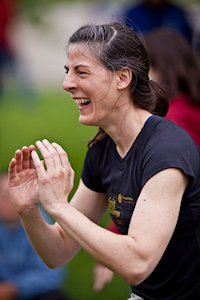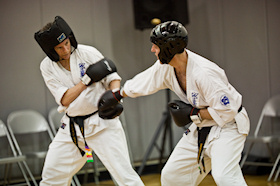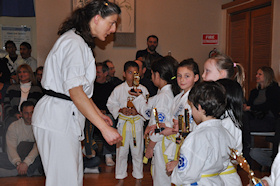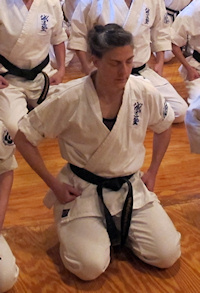2020 February
2018 December August June February
2017 December September June March
2016 November August June March
2015 December October July May February
2014 December October July April February
2013 December October August May February
2012 December September July April February
2011 December September July April February
from the February, 2012 issue of Kiai!
Profile of a Thousand Waves Leader:
Senpai Katherine Nichols
By Jun Shihan Nancy Lanoue
Co-Executive Director
Many Kiai! readers know Senpai Katherine from training alongside her or watching her loving and skillful teaching of their kids in the Junior and Youth Seido programs. To celebrate her upcoming promotion to 4th degree black belt (Sensei rank), I asked her to share her thoughts with our community about her evolution as a martial artist and teacher. I hope you enjoy her thoughtful responses to my questions, and are inspired to follow in her path of dedicated and disciplined training.
 JSN: When did you start training? What drew you to the dojo?
JSN: When did you start training? What drew you to the dojo?
KN: I was raised to be afraid to be out alone at night. When I moved away from home to a series of college towns, I enjoyed newfound independence. I was reluctant to give up my new freedom when I moved to Chicago in 1993 at age 31, but I was nervous about living in the big city, so I looked for a self-defense class. I chose IMPACT, a four-week class taught by (now Sensei) Martha Thompson, and I loved it. I loved not only the confidence I gained walking in the city, but also the excitement of fighting in the class. After that, I wished to practice my self-defense skills more regularly. In the late summer of 1994, I went on a canoe trip where I met several Thousand Waves students, including Kyoshi Martha Fourt (who was then a Nidan). They talked in such glowing terms of the dojo and all the fun yet practical things that happened there that I signed up right away and have been training steadily ever since.
JSN: What is a typical weekly training schedule for you?
KN: I try to train four days a week and generally take the class immediately after I teach the kids on Monday, Tuesday and Wednesday, staying for the full evening program on Wednesday. In addition I usually take two classes on either Friday evening or Saturday afternoon. If I have to miss one of my regular days, I make it up on an alternate day. As my guitar class is temporarily on Tuesdays, I currently train on an alternate day every week, which usually means training BOTH Friday & Saturday, while keeping Thursday or late Monday in mind as possibilities if I am unable to do that.
JSN: What is your favorite part of Seido karate and why?
KN: Sparring! Because it's the most playful part of karate. It's a chance to apply my fighting skills in a freestyle situation with a partner bringing unpredictability and other challenges. Partner work in general is my favorite. I enjoy the structure of partnership in which to interact with all sorts of people. One way of seeing it is that Seido partner curricula provides games for us to have fun playing together, even if we don't otherwise know each other very well. You could say this is one way karate helps make peace.


JSN: Please describe some important feedback you’ve gotten from your teachers and have used to make yourself a better martial arts student.
KN: Almost everything I can do in karate is due to important feedback from my teachers. From all I have absorbed, nothing stands out at this moment as being more important than anything else. The things I remember being told are those I apparently don't do yet, since the repetition with which I've heard them makes them more memorable. I have been told again & again that I need to relax my muscles more during techniques to gain speed and power. Also that I need to lower my center of gravity and drive my power from my center instead of the extremities. The fact that I still repeatedly receive this feedback after thinking I've already absorbed it, is an example of how helpful a teacher can be to bridge the disconnect between interior and exterior perception of self.
J SN: At eight classes a week, you are also a key teacher in the Junior and Youth programs. What is the most important thing you try to teach the children in your classes.
SN: At eight classes a week, you are also a key teacher in the Junior and Youth programs. What is the most important thing you try to teach the children in your classes.
KN: Awareness. Of the Body and the Self, and Others. This is important not only for self-defense/safety but for moving through life with full being; being what one is meant to be. To know when a circumstance is unhealthy, yet to withstand discomfort if it is not harmful, because discomfort often is necessary to accomplish what one wants or what is right. Awareness is taught not usually explicitly, but through repeated practice of karate.
JSN: And what is the most important thing they teach you?
KN: It has been good to get to know so many kids as individuals--to see how hard they work on their karate, yet how playful they are. I see that they are all good people--even the ones who are more difficult to manage. This is something I was not able to see when I was their age among other kids, so my current perspective allows healing--and compassion for difficult people of all ages. Working with them gives me practice in keeping a calm state of mind in chaotic situations, and practice in managing the situations to prevent chaos. This state of mind is important not only for teaching, but for self-defense.
JSN: Kyoshi Sarah and I recently invited you to test for Yondan, 4th degree black belt. This rank represents a level of dedication and mastery that is extremely rare. In our dojo’s 27 year history, only 15 students have earned this rank. How are you preparing for the test?
KN: I will continue to train steadily, with a focus on improving my basics and deepening my knowledge of all the curriculum. I hope to enjoy the support of the TW community with some training dates, in addition to practicing more on my own. While training so much, I am also taking extra good care of my body. Also I intend to practice enjoying doing karate with my eyes closed, as many of the Junior students do!
JSN: During the long hours of your test as you show Kaicho and Nidaime your version of Seido karate, what three qualities will you strive the hardest to communicate?
KN: As I said above, I am working to consolidate my knowledge of the curriculum, and I hope my preparation enables me to perform confidently and with strong spirit when I am under scrutiny at the test. I hope my love of karate will show, even though I might be very tired. Ultimately, I want to demonstrate the qualities which Kaicho lists in his books as being most important: Strength, Technique & Spirit!
